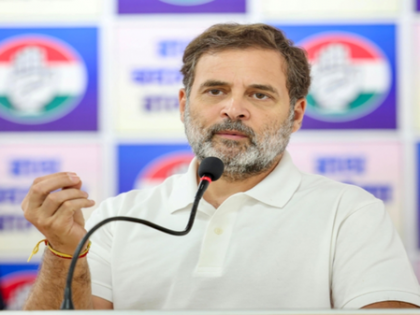Congress' past wins also saw big voter increases - undermining current fraud claims
By IANS | Updated: June 10, 2025 17:08 IST2025-06-10T17:02:56+5:302025-06-10T17:08:20+5:30
New Delhi, June 10 Congress leader Rahul Gandhi’s claim alleging electoral malpractice during the 2024 Maharashtra Assembly elections ...

Congress' past wins also saw big voter increases - undermining current fraud claims
New Delhi, June 10 Congress leader Rahul Gandhi’s claim alleging electoral malpractice during the 2024 Maharashtra Assembly elections has sparked a fresh political debate, with data analysts and political observers pointing out glaring inconsistencies in his argument. The Leader of Opposition in Lok Sabha alleged that the voter lists were manipulated to benefit the BJP-led National Democratic Alliance (NDA), which emerged victorious in the 2024 Maharashtra Assembly polls held months after the Lok Sabha elections.
Central to his claim is the assertion that the number of registered voters jumped from 9.29 crore during the Lok Sabha elections to 9.70 crore in time for the Assembly polls, suggesting what he called “match-fixing” through voter list inflation.
Analysts argue that this pattern of increased electorates between Lok Sabha and Assembly elections is neither new nor unprecedented — nor has it exclusively benefited the BJP. In fact, historical data from previous election cycles show similar or even steeper increases in voter numbers that coincided with victories for the Congress-led alliance.
The data from the past shared by the data-focused X handle infoindata presents a counter-narrative. The numbers show that substantial increases in voter numbers have occurred in past election cycles across both Lok Sabha and Assembly elections in Maharashtra, often coinciding with electoral victories for the Congress-led alliance.
In 2009, for instance, the electorate increased by 69.88 lakh (10.59 pc) in Maharashtra ahead of the Lok Sabha elections, during which the Congress-led alliance secured a majority of the seats (25/48). In the Assembly elections that followed the same year, the voter count rose by 30.14 lakh (4.13 pc), again resulting in a Congress-led win (144/288).
A similar pattern was observed in 2004, when the number of voters went up by 61.36 lakh (10.79 pc) in the Lok Sabha elections, during which the Congress-led alliance won 23 out of 48 seats. In the subsequent Assembly elections, voters increased by 29.54 lakh (4.69 pc) and Congress secured 152 out of 288 seats.
Even in the 2019 Assembly elections, where the Congress-led alliance won 158 seats, there was a rise in the voter list by 11.61 lakh. In the 1998 Lok Sabha elections, voters increased by 9.51 lakh, and the Congress-led alliance won 33 out of 48 seats.
Most notably, in the 2024 Lok Sabha elections held earlier this year, voter registration went up by 32.23 lakh (3.59 pc) in Maharashtra. Far from being disadvantaged, the Congress-led alliance performed strongly, winning 30 out of 48 seats in the state. This trend raises serious questions about the logic behind Rahul Gandhi’s allegations.
If a rise in voter registration amounts to electoral manipulation, observers argue, then Congress must also explain its own past victories in years where the increase in electors was even more significant.
Moreover, if an increase in voter count is to be seen as suspicious or indicative of manipulation, then Congress must also account for its own historical successes that coincided with even higher increases in electorates. In 2009, for example, the increase was more than 69 lakh — significantly higher than the 41 lakh increase Gandhi flagged in 2024 — and yet Congress celebrated a resounding victory then, say observers.
Experts point out that updates to electoral rolls are a routine function of the Election Commission and are expected in a dynamic and growing democracy. These include additions of first-time voters, corrections of previous errors, and inclusion of previously excluded eligible citizens. In a state like Maharashtra, with high migration, urbanisation, and population growth, such increases are not only plausible but expected.
Political analysts are questioning the internal consistency of Gandhi’s argument. If rising voter numbers are to be treated with suspicion only when the BJP wins, but not when the Congress-led alliance benefits, the claim loses credibility. Critics argue that such statements risk undermining public confidence in democratic institutions without substantive evidence.
The data suggests that the rise in voter numbers in 2024 is not an anomaly, nor is it without precedent. Past elections won by the Congress-led alliance — often with even larger voter increases — weaken the claim that the 2024 Maharashtra Assembly election was manipulated through artificial inflation of the electorate. Without concrete proof of wrongdoing, the rise in voter registration alone does not justify allegations of match-fixing.
Disclaimer: This post has been auto-published from an agency feed without any modifications to the text and has not been reviewed by an editor
Open in app